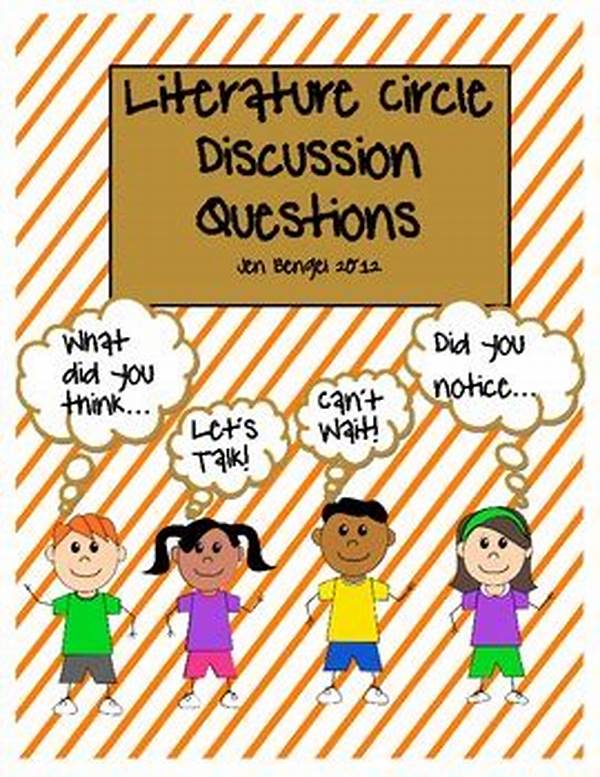Once upon a time in a world overflowing with stories, there was a young writer named Alex who was captivated by the intricate layers that made up the characters in the books they read. Alex realized that the magic of any narrative lies in the characters, with their tangled motives and backstories waiting to be unraveled. Driven by this fascination, Alex embarked on a journey fueled by curiosity and creativity to craft in-depth character analysis questions that would plumb the depths of any character’s soul.
Read Now : Picture Books Enhancing Toddler Communication
Exploring the Heart of Characters
So, here’s the scoop: when it comes to in-depth character analysis questions, it ain’t just about understanding the plot—the real juice is getting inside the head of these characters. Imagine peeling back layers like an onion, but instead of tears, you get those “aha” moments. Every character, from the silent sidekick to the charismatic lead, has a backstory that adds richness to the narrative tapestry. These questions help us dig deep, revealing what makes a character tick. Why did they make that risky move? What’s with that nervous habit of theirs? Through in-depth character analysis questions, you’re not only learning about a character but also unraveling the bigger themes that govern the story. These questions encourage us to step into their shoes, to see and feel the world from their perspective. It’s the heart and soul of storytelling, where every nook and cranny of a character’s psyche is laid bare, ready to be explored.
The Art of Slang in Character Analysis
1. Personality Vibes: In-depth character analysis questions dig into the character’s essence. You know, like what makes them tick or what gives them the heebie-jeebies. It’s all about those vibes, man!
2. Past Shadows: No mystery’s solved without sniffing out the past. In-depth character analysis questions reveal the ghosts in their closet—what’s haunting them or pushing them forward.
3. Motivational Juice: Getting to the core of why a character does what they do is like sippin’ on the good stuff. These questions unlock their deepest desires and wildest dreams.
4. Quirky Habits: Ever notice those oddball manners a character’s got? In-depth character analysis questions put a spotlight on those quirks, making them human, relatable.
5. Future Dreams: We’re talking projections into their future. In-depth character analysis questions speculate on where they’re headed, what’s in the next chapter of their life story.
Slang in Storytelling
You ever notice how certain words just click? That’s where slang hops into the narrative. When using in-depth character analysis questions, slang is like the unsung hero, making dialogues pop, adding authenticity and flavor. It’s like a warm, comfy sweater your grandma knitted just for you—it fits just right. Dialect matters, too; it speaks volumes about the character’s background, their struggles, even their joys. Slang isn’t just thrown in for color, it’s strategic, revealing layers and adding depth. It brings that edge, that raw-real vibe to your analysis, making the characters as relatable as the kid next door. With in-depth character analysis questions, discovering the right slang for each character is like finding the right spice for a dish—it enriches the experience, makes it memorable. You navigate the nuances, the undertones, unlocking a treasure trove of insights about who they truly are beneath the surface.
Diving Deeper into Slang
-To decode a character’s world through in-depth character analysis questions, slang is a master key.-Characters speak different shades of slang, reflecting their growth, their inner battles.-The right slang helps position a character within their cultural context.-Slang lets you in on the character’s socio-economic status without overtly stating it.-In-depth character analysis questions reveal growing evolutions in a character’s slang over the narrative.-What slang is picked or discarded ? Those choices signify changes—a portrayal of maturity or shifts in alliances.-Slang reveals the character’s influence: Are they a trendsetter? A follower?-It also hints at the relationships they value, the ones they push away.-In-depth character analysis questions help determine if a character uses slang to hide insecurity or assert dominance.-The evolution of slang within a character’s dialogue can mark them as dynamic or static.
Read Now : Engaging Snowy Crime Thrillers
The Power of Slang in Character Dynamics
Once you get deep into the weeds of in-depth character analysis questions, you realize just how much slang shifts the narrative landscape. It’s like surfing, really—some ride the wave effortlessly, while others crash straight into it. Characters who command their own version of slang possess an effortless swagger. They talk the talk without missing a beat, making them stand out like a gem in a sea of rocks. Depending on their mood, a character can switch it up, code-switching between slang and formal talk as a way to fit in or stand out. Here’s the kicker: a character’s slang can either alienate them from others or forge unbreakable bonds.
In-depth character analysis questions enable you to explore just how far back their use of slang goes, tracing it through family ties, childhood roots, or maybe even a rebellion phase. Slang isn’t just a linguistic preference; it’s an extension of the character’s identity. When you pinpoint the origins of their slang, you uncover bits of their story, like peeling bark from an ancient tree to reveal the rings within. How a character’s slang evolves says bucketloads about their internal journey. Do they grow jaded and drop the lingo, or embrace it as they lean into who they are? This, my friend, is the beauty of in-depth character analysis questions—it doesn’t just scratch the surface, it draws a map of the soul.
The Lingua Franca of Characters
Yo, when diving deep with in-depth character analysis questions, slang is the secret sauce that seasons a story to perfection. Characters, whether in books or on the silver screen, speak in tongues that reflect their tribe, their era, their essence. Dialects, idioms, catchphrases—they ain’t just fillers, they are the heartbeat of dialogue. A character with a unique slang is like a graffiti artist—expressive, bold, unapologetic. Each phrase they drop might hold clues about their alliances and antagonists. Listen up close, ’cause their slang could be a shout-out to their community or a rebellion against it. The in-depth character analysis questions probe into these choices to uncover the thematic landscapes.
Lemme tell ya, dialogue isn’t just about communication; it’s about expression, revelation. Slang shows the age, the vibe, the socio-economic footprint of a character, no doubt! It’s the raw truth pressing through the lines. In analyzing, each slang twist reveals more of their human story, more of their spirit. The magic of in-depth character analysis questions is that you can better understand their journey and growth through their evolving vocabulary, like reading a map of their heart and mind. Slang tells us where they stand in the world and within themselves—their roots, their wings.
Summary of Slang Writing Style
Slang, my friend, is the spice of any dialogue. It’s the street-smart cousin of formal language, adding authenticity and realness to characters. In-depth character analysis questions shift gears when writers introduce slang—they get to the heart of a character’s authenticity, roots, and aspirations. Slang paints layers of emotion, offering a sneak peek into the character’s universe, showcasing culture, era, and lifestyle. Be it a wise-cracking detective or a brooding teenager, their slang speaks volumes louder than formal monologues ever could.
In the realm of in-depth character analysis questions, slang is the X-factor that transforms a plain sketch into a vivid portrait. It’s like listening to a secret language, a whispered story only a few can decode fully. The richness it brings is unparalleled. Every word, every phrase ain’t just a word or phrase—it’s a piece of their soul, their history. Through the in-depth character analysis questions, the slang used is the thread that connects a character’s past and future, quirks, and triumphs, making them memorable, relatable, and so very human.




